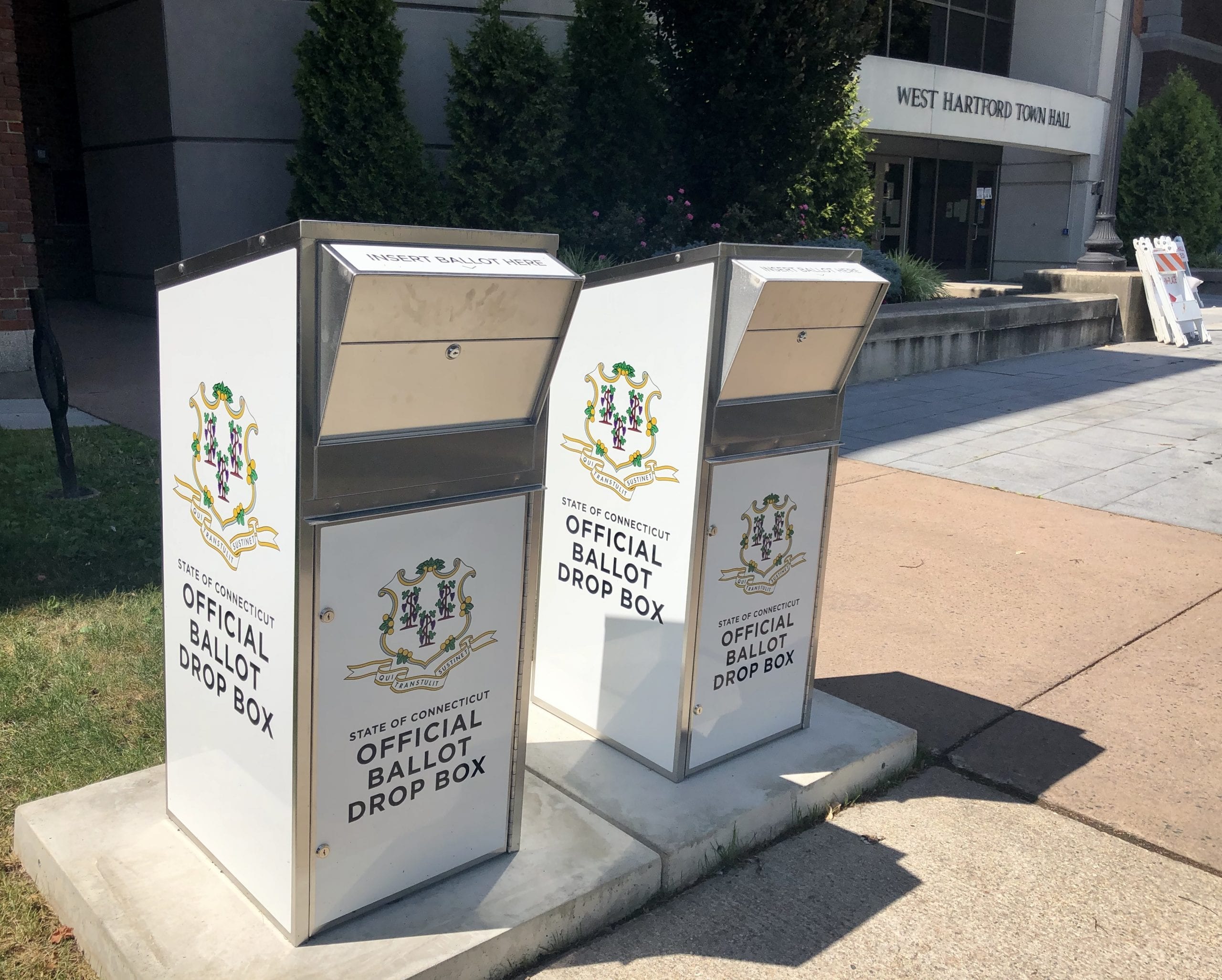Committee Checks Off Early Voting, No-Excuse Absentee Voting

Audio By Carbonatix

Secure Absentee Ballot boxes are in front of West Hartford Town Hall (near the parking lot) and can be used to drop off applications as well as completed ballots. Photo credit: Ronni Newton (we-ha.com file photo)
State Sen. Derek Slap of West Hartford has expressed his strong support for greater flexibility in state elections laws, which could be on the ballot in 2022.
By Hugh McQuaid, CTNewsJunkie.com
Resolutions to let voters consider allowing early and no-excuse absentee voting cleared the Government Administration and Elections Committee Friday, marking the first step in a long process to amend the state constitution.
If approved by the legislature, the resolutions would send ballot questions to Connecticut voters asking for greater flexibility to change state election laws. One resolution applies to laws on no-excuse absentee voting. The other regards laws on early voting.
The committee left its votes open until Friday evening, but members present voted largely along party lines for the resolution on absentee ballots. Some Republicans joined Democrats in supporting the resolution on early voting.
Supporters of the changes pointed Friday to the roughly 650,000 voters who cast absentee ballots in the 2020 election. The state took emergency action last year allowing no-excuse absentee voting to shield residents from exposure to the coronavirus. Rep. Gregg Haddad, D-Mansfield, said it was a successful pilot program for expanded access to voting.
“There have been no complaints in Connecticut about any of our own elections, on the elections of our congressional delegation, or even the results of the presidential election in Connecticut despite the fact that a large number of folks cast their ballot by absentee,” Haddad said. “I think that speaks to the security of the system.”
Sen. Derek Slap, D-West Hartford, said Connecticut’s voting laws were currently more restrictive than those in many other states.
“What about the people who are being disenfranchised right now because of our restrictive voting laws and who are working three jobs and can’t get to their polling place or have to wait hours and hours in line?” Slap said. “There are all sorts of ways that we need to make it easier to vote and still be secure.”
Slap earlier said he was pleased at the public support for early and no-excuse absentee ballot voting. “As a member of the GAE Committee and as a co-sponsor of both of these bills – and having co-sponsored such legislation in the past – I was heartened by today’s overwhelming, essentially unanimous public support for these early voting and no-excuses absentee voting bills,” he said in a statement following a public hearing in late February. “As Senate Chair of the Aging Committee, I was also very pleased to hear from the AARP and from several grandparents who testified how necessary and easy to was for them to vote by mail last fall, and how they look forward to doing so again in the future. For all those reasons, and for the good of our democracy, I’m happy to support both of these bills.”
Some Republican members of the committee said the resolutions to put the questions before voters lacked adequate safeguards to prevent voter fraud.
“It must be done in the right way, there must be protections in place and there must be checks and balances in there. Until we do that– or at least make a step in the right direction to do that, I could not support this,” Rep. Gale Mastrofrancesco, R-Wolcott, said.
During the meeting, Sen. Rob Sampson, R-Southington, introduced several changes to narrow the scope of the constitutional amendments or add policies like requiring photo identification in order to cast a vote. The committee rejected Sampon’s proposals.
“The people I represent do want to see photo ID and they do want to see checks and balances employed in our voting laws,” Sampson said.
During a February public hearing Sampson made unsubstantiated claims of voter fraud and during Friday’s debate Sen. Mae Flexer, D-Killingly, reminded the committee what they should do if they encounter voter fraud.
“I would encourage anyone who’s on this committee or anyone who’s watching the debate in this committee to please follow the process that was outlined in this discussion. If you have an instance where someone has committed voter fraud to your knowledge, you need to report it to the elections enforcement commission,” she said. “That is where an actual adjudication of fraud can take place. Not just allegations, not just statements that ‘I know this thing happened in such and such a place.’ Please report it. We do take them seriously.”
Rep. Matt Blumenthal, D-Stamford, said it was up to voters to decide whether the amendment would pass and it would be up to them whether to re-elect legislators if they ultimately voted to change election laws
“What we’re really talking about is a matter of trust and who we’re asking whether we trust is the Connecticut voters. Do we trust Connecticut voters to decide whether we should have early voting?” Blumenthal said. If lawmakers used the amendments to enact “absurd” election laws, voters would decline to re-elect them, he said.
“I think we all have to say ‘Yes. We do trust the people of Connecticut, the voters of Connecticut, to do that.’ Otherwise, I don’t know why we’re here,” Blumenthal said.
The two resolutions are on slightly different tracks. In order to appear on the ballot, the legislature must approve a resolution to amend the constitution with a 75% majority or approve it by a simple majority in two different years. Lawmakers have already approved the early voting resolution once by simple majority and, if passed, it will be on the ballot next year. The proposal on absentee voting must either pass by supermajority or appear again in another session.
On Friday afternoon, Secretary of the State Denise Merrill released a statement calling the committee’s action an important first step to bringing Connecticut’s voting laws in line with most other states.
“I look forward to the passage of these amendments in the House and the Senate so the voters of Connecticut can decide if they want the choice to vote early in-person, in-person on Election Day, or by absentee ballot without needing an excuse,” Merrill said.
Republished with permission from CTNewsJunkie.com, all rights reserved.
Like what you see here? Click here to subscribe to We-Ha’s newsletter so you’ll always be in the know about what’s happening in West Hartford! Click the blue button below to become a supporter of We-Ha.com and our efforts to continue producing quality journalism.



